
You can support Terra Relicta by donating! Please, do so, and thank you!

Interview with: Sean Jude
Conducted by: T.V.
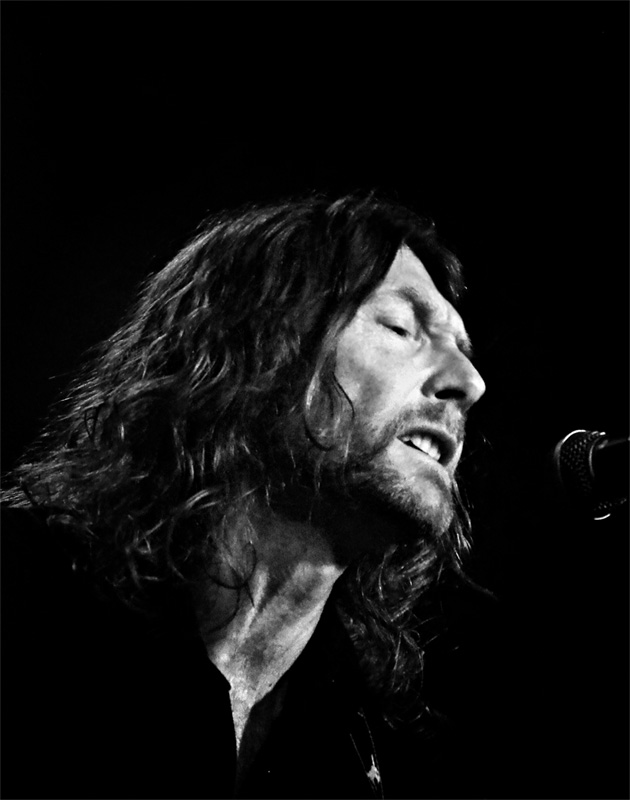 Liverpool UK-based 4-piece Leafblade launched skyward in 2003, growing out of their initial incarnation as UK masters of the theatrical and the unique, Valle Crucis, active during the 1990s; a dynamic, often volatile mix of fiercely progressive rock and pagan metal, conflated with lush passages of orchestration, breath vocal and virtuosic refrains worked on classical and acoustic guitars. This arena was vocalist/guitarist Sean Jude’s and bass player Kevin Murphy’s first stomping ground, outing their unique, and ever-critically acclaimed work both privately and under the auspices of almost continuous minor deals. Since its inception as Leafblade, the band released two full lenght albums, Beyond, Beyond in 2006 and The Kiss Of Spirit And Flesh in 2013. But there's a lot of things behind Leafblade and bands frontman, vocalist and guitarist Sean Jude, a poet, who's truly a musical treasure trove, revealed a lot of interesting things regarding the band, their past and future, meanings and concepts behind both albums, constant endeavours in reaching the perfection, stories often intertwined with Anathema dudes amongst others. So, take some time and read this insightful interview, but most of all make sure, if you haven't yet, to discover this amazing and unique band.
Liverpool UK-based 4-piece Leafblade launched skyward in 2003, growing out of their initial incarnation as UK masters of the theatrical and the unique, Valle Crucis, active during the 1990s; a dynamic, often volatile mix of fiercely progressive rock and pagan metal, conflated with lush passages of orchestration, breath vocal and virtuosic refrains worked on classical and acoustic guitars. This arena was vocalist/guitarist Sean Jude’s and bass player Kevin Murphy’s first stomping ground, outing their unique, and ever-critically acclaimed work both privately and under the auspices of almost continuous minor deals. Since its inception as Leafblade, the band released two full lenght albums, Beyond, Beyond in 2006 and The Kiss Of Spirit And Flesh in 2013. But there's a lot of things behind Leafblade and bands frontman, vocalist and guitarist Sean Jude, a poet, who's truly a musical treasure trove, revealed a lot of interesting things regarding the band, their past and future, meanings and concepts behind both albums, constant endeavours in reaching the perfection, stories often intertwined with Anathema dudes amongst others. So, take some time and read this insightful interview, but most of all make sure, if you haven't yet, to discover this amazing and unique band.
T.V.: Hi Sean, how are you? First of all tell me what's going on in the Leafblade camp right now? Have you already begun working on new songs?
Sean: Hello to everyone reading and to one and all at Terra Relicta! All's well at the Leafblade camp. We're always busy rehearsing, expanding repetoire for the live set, doing whatever promotion we can and looking at new things to record. I've written a thousand or more pieces, and we work together on other stuff, so there's a lot to choose from! Leafblade have plans to record an acoustic EP in late autumn, and already have listed a few songs for the new album to follow on The Kiss Of Spirit And Flesh. We'll have to wait and see what our record company, Kscope, say about the schedule! For the moment, Leafblade are working towards a few coming Viking and Medieval festival gigs in England, and a few Healing Festival shows in Scotland, over the autumn.
T.V.: So, very busy times in front of you. Still, I want to dig a bit deeper and want to ask you for more details about the EP you mentioned and as well about the upcoming album, maybe some titles, anything?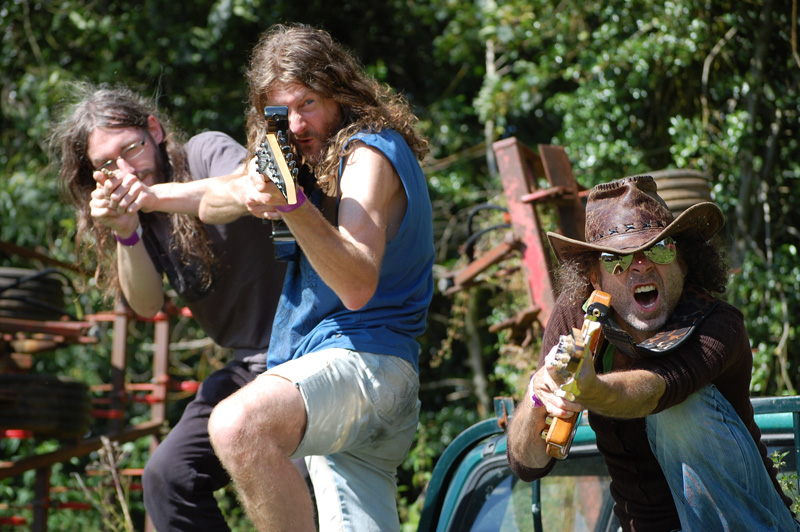 Sean: I usually keep my cards close to my chest, Tomaz – there are invividuals not too far from Leafblade who have a vested interest in what I produce and discuss. But, sir, you heard it here first! The EP will probably be a short acoustic piece with lavish vocal harmonies... the one true summer of the butterflies perhaps, thrilled with glissando guitars and rhythms, or a Pagan Celtic wedding, deep in the wildwood. Themes in Nature's depths, but relevant to the human condition: the brief duration of our lives, and how we celebrate it. It is not a conspiracy against us, but something we move through and adapt to, whether it be the one true dance of the butterfly, or our own brief, metaphorical summer. The Pagan theme celebrates the power of the Celtic consciousness and the majestical 'faerie' themes (like 'The Hollow Hills') of the English sixteenth-century poets.
Sean: I usually keep my cards close to my chest, Tomaz – there are invividuals not too far from Leafblade who have a vested interest in what I produce and discuss. But, sir, you heard it here first! The EP will probably be a short acoustic piece with lavish vocal harmonies... the one true summer of the butterflies perhaps, thrilled with glissando guitars and rhythms, or a Pagan Celtic wedding, deep in the wildwood. Themes in Nature's depths, but relevant to the human condition: the brief duration of our lives, and how we celebrate it. It is not a conspiracy against us, but something we move through and adapt to, whether it be the one true dance of the butterfly, or our own brief, metaphorical summer. The Pagan theme celebrates the power of the Celtic consciousness and the majestical 'faerie' themes (like 'The Hollow Hills') of the English sixteenth-century poets.
T.V.: It's been quite some time between the releases of your two albums, Beyond, Beyond (2006) and The Kiss Of Spirit And Flesh (2013). Tell me what took you so long?
Sean: I was touring continously in Europe, so recording time was on a premium. The Kiss Of Spirit And Flesh was recorded (and should have been released) in 2011, but it was a case of Kscope records finding a window in their schedule for Leafblade. The album was also remixed with additions, so time wore on, before the contract arrived. Then it was a case or arranging artwork and CD libretto. I was also working extensively behind the scenes with fellow wizard Kevin Murphy, looking at a new line-up and promo ideas. Besides that, I was getting a lot of work as an actor, trying to earn that very strange thing called 'a living'. And how times roars on!
T.V.: Leafblade was formed back in 2003 and one of the founding members is Daniel Cavanagh from Anathema, but in the new line-up he's not listed anymore. Still he produced your last album and I wonder what part, if any, has he now in Leafblade?
Sean: Dan and the other Anathema lads have, in the twenty-odd years I've known them, been close to my musical output. They've been impressed by it, and have a guarded respect for it, for Leafblade, for what the old band Valle Crucis achieved. Dan wanted to produce the first 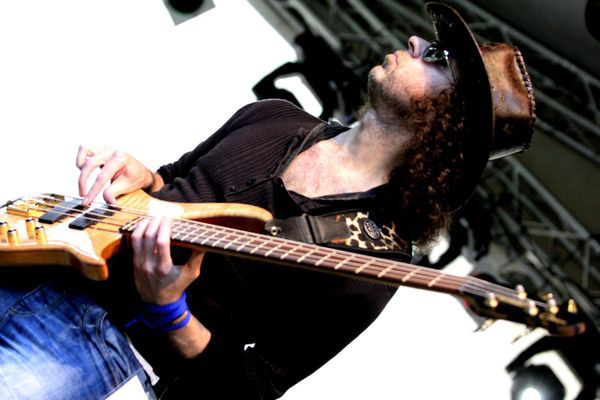 major Leafblade release. He loves the stuff, finds in it a sense of what he calls 'home'. We worked well in the studio together, after ten years on the road doing the more acoustic works. I haven't worked with Dan since playing live with him at a Leafblade show in London in July 2013, at the Kscope five-year anniversary party. He's been very busy doing his own thing, and so have I, so we have drifted. That's fine with me. He will play no part in the next Leafblade album, whomever Leafblade are signed to. He's that busy, I doubt he wants to work with Leafblade, and I want to work with new faces, newer, more open minds, people who want to work with Leafblade as a unit, instead of myself alone. I'm in a band, after all, and my music would be a great deal less than it is without my fellow band spirits adding to the output. Dan just wanted to work with me, which was a strain. I look forward to a continued musical life without him in the vicinity, embracing newer, more advanced, challenging, progressive music.
major Leafblade release. He loves the stuff, finds in it a sense of what he calls 'home'. We worked well in the studio together, after ten years on the road doing the more acoustic works. I haven't worked with Dan since playing live with him at a Leafblade show in London in July 2013, at the Kscope five-year anniversary party. He's been very busy doing his own thing, and so have I, so we have drifted. That's fine with me. He will play no part in the next Leafblade album, whomever Leafblade are signed to. He's that busy, I doubt he wants to work with Leafblade, and I want to work with new faces, newer, more open minds, people who want to work with Leafblade as a unit, instead of myself alone. I'm in a band, after all, and my music would be a great deal less than it is without my fellow band spirits adding to the output. Dan just wanted to work with me, which was a strain. I look forward to a continued musical life without him in the vicinity, embracing newer, more advanced, challenging, progressive music.
T.V.: And yet again, also the rest of Cavanagh brothers took in this or the other way a part of Leafblade...
Sean: Since the riotous early days of Valle Crucis in the 90s, one of the brothers has always been involved in the recordings. Jay has produced Valle Crucis' acclaimed and privately released A Garden Of Verses in 1995, and later, in '99, at a session of Valle Crucis' The Birth Of Venus And Mars, Vinny assisted in production and final mix, Dan played some guitar. They were all eager for involvement. Anathema (or Pagan Angel as they once were) had supported Valle Crucis at a Hallowe'en night many years ago, and Vin had actually joined Valle Crucis over 1996. Ten years back, Vin had actually asked me about giving him a bit of vocal coaching, and Dan had wanted to get on tour with me and sing my library of acoustic stuff. Dan's involvement with Leafblade's recent albums is well documented, but Jay had assisted in pre-production on The Kiss Of Spirit And Flesh. I did a full European tour with Anathema in 2009, which was a great experience, mostly for my contact with Les Smith, who has always been a good friend of mine and a man for whom I hold the most respect in any of the members of Anathema. Duncan Patterson has also been a great mate over the years. We've shared a few tours, meetings and conversations; a real laugh.
T.V.: That's very interesting! If I understand that right Vincent Cavanagh was somehow coached by you?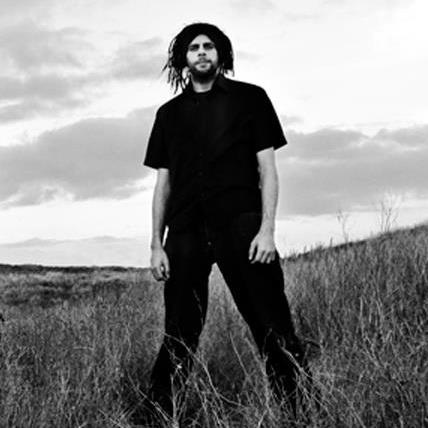 Sean: No! Several years back, he asked me for a few pointers for him; technical help with breath and sustain. Anathema don't even sing in concert pitch anyway.
Sean: No! Several years back, he asked me for a few pointers for him; technical help with breath and sustain. Anathema don't even sing in concert pitch anyway.
T.V.: And as you mentioned Duncan Patterson, I'm interested to know what do you think about his after-Anathema musical creations (Antimatter, Ion, Alternative 4,...)?
Sean: Duncan is a great friend of mine, and a creative spirit that I will always enjoy the company of, and take the time to talk with about the world, its humour, its shadow. But we will always have a laugh, as we have done on numerous occasions at gatherings and tours. There is no bullshit or affection with Dunc (Uncle Dunc, as I like to call him). He is honest, down to earth, and a poet, above all. He isn't just a lyricist, but a poet. There's a difference. We poets go deep. I've worked with too many shallow bastards, and that has all come to an end. I stick close with spirits I know I vibrate well with, who are truthful, and have a good backbone. Dunc very recently sent me a photograph from his 21st birthday, a photo of us, the Valle Crucis lads and Cradle Of Filth. A memorable night! As too his musical output, to be honest, I don't really show much interest in the scene around me, or take the time to listen to even my close friends' music. Maybe I should, but I've always walked a solitary path and paid very little attention to the creative output of those people I know. There is still a meditative, shadowy and often romantic yearning feel to what I've heard, and it doesn't always appeal. Very loosely, I need a bit more optimism and hope in music. I moved through my desolation phase many years ago, this intellectual gravity. It's all well produced, and I love Martin Powell's (ex Cradle Of Filth, ex My Dying Bride, ex Anathema,...) keys work. (Martin is another great bud – he sessioned on an unreleased Valle Crucis album in 1999, and did an astounding job.)
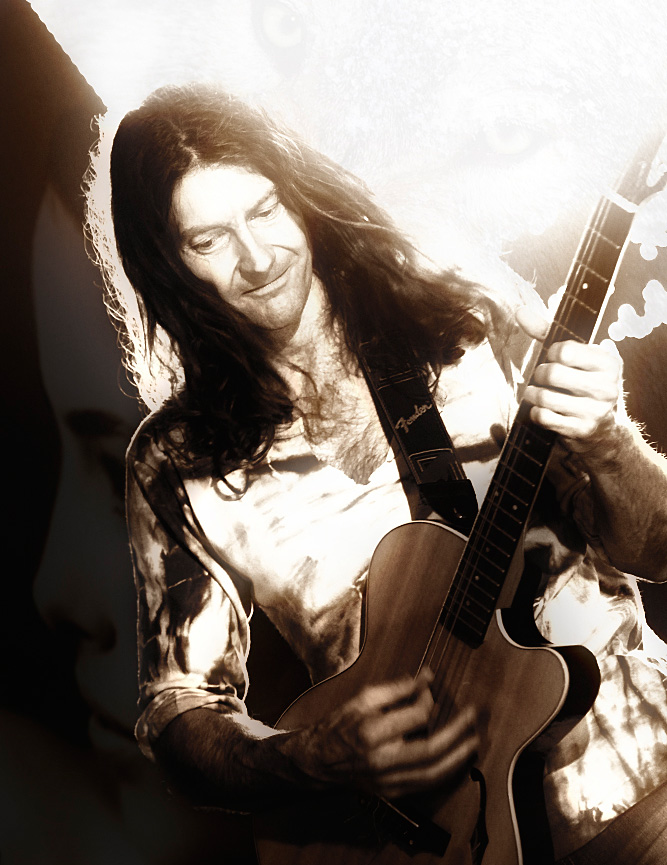 Sean: In 1996, they had gone through a terrible time. I was always the other brother, growing up with them, doing the usual things. I did some tech work for them at the Dynamo Festival in 1996. Individually, privately, I was approached by firstly Dan, then Vin, to ask would I work with them. Collaboration with Dan seemed likely, but after promising a few things, he just vanished, without even a phonecall. I was irate, told him so, then we patched things up. My anger was born from the knowledge in that here I was, an up and coming composer in a relatively unknown act, Valle Crucis, trying to establish myself on the scene, getting pissed about by someone in a growing, more established act, who should've known better and been more professional. But no, so I became a psychopath in my reaction! But back then, I was still a discerning professional and wouldn't take any shit, so I worked with Vin for the next year or so, he doing more guitar in Valle Crucis, but still playing with his other band. We released an acclaimed private recording that went out on the underground in 1997 Three Adorations, then Vin did a bit of guitar on the next release in 1999 The Birth Of Venus And Mars. I've jammed with them all, worked on stuff with them all, toured, recorded, and (when I used to have a beer) been pissed with them all, tried educational toxins and done one or two other things unmentionable in this interview, up until the last Leafblade album. But I'm pretty much done with the association. I am a creative spirit in my own right. But as Mick Moss (Antimatter) will tell you, sometimes it's difficult to cast off the history, especially as mine is so intertwined. On the 2009 European tour with them, Leafblade played as special guests. At a show in Sweden, I was joined by Dan on guitar, Jay on bass, and then Vin crept up to join in on the kit. It was okay while it lasted, but then just thought, fuck me – this is Sean-athema.
Sean: In 1996, they had gone through a terrible time. I was always the other brother, growing up with them, doing the usual things. I did some tech work for them at the Dynamo Festival in 1996. Individually, privately, I was approached by firstly Dan, then Vin, to ask would I work with them. Collaboration with Dan seemed likely, but after promising a few things, he just vanished, without even a phonecall. I was irate, told him so, then we patched things up. My anger was born from the knowledge in that here I was, an up and coming composer in a relatively unknown act, Valle Crucis, trying to establish myself on the scene, getting pissed about by someone in a growing, more established act, who should've known better and been more professional. But no, so I became a psychopath in my reaction! But back then, I was still a discerning professional and wouldn't take any shit, so I worked with Vin for the next year or so, he doing more guitar in Valle Crucis, but still playing with his other band. We released an acclaimed private recording that went out on the underground in 1997 Three Adorations, then Vin did a bit of guitar on the next release in 1999 The Birth Of Venus And Mars. I've jammed with them all, worked on stuff with them all, toured, recorded, and (when I used to have a beer) been pissed with them all, tried educational toxins and done one or two other things unmentionable in this interview, up until the last Leafblade album. But I'm pretty much done with the association. I am a creative spirit in my own right. But as Mick Moss (Antimatter) will tell you, sometimes it's difficult to cast off the history, especially as mine is so intertwined. On the 2009 European tour with them, Leafblade played as special guests. At a show in Sweden, I was joined by Dan on guitar, Jay on bass, and then Vin crept up to join in on the kit. It was okay while it lasted, but then just thought, fuck me – this is Sean-athema.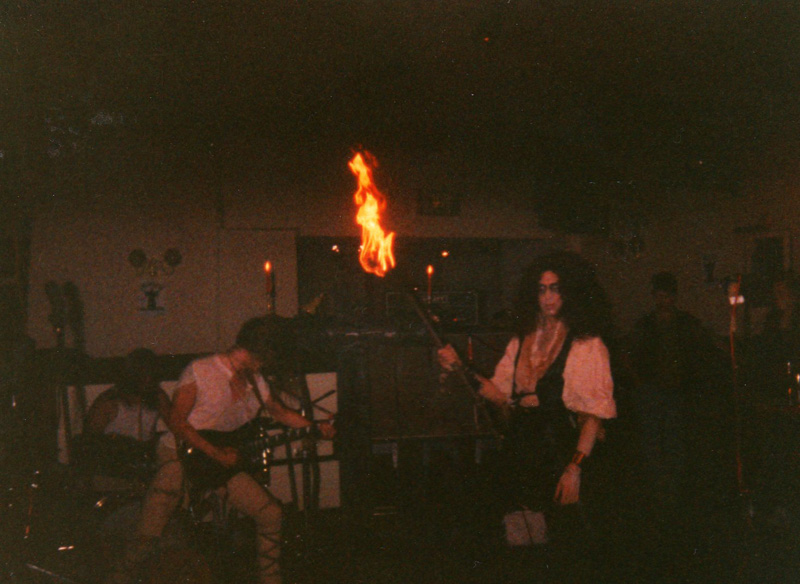 touring with Dan, and Leafblade had the right tones for the more acoustic, lightly medieval-sounding stuff. But Valle Crucis are alive and well! The music lives on in Leafblade. The beautiful thing is, since Leafblade have launched with the more dynamic, anthemic, heavier stuff, we've been playing alot of older, darker, stunning Valle Crucis numbers at festivals, and this has been great for the spirit. Leafblade become more versatile, active, full-on, keeping Valle Crucis alive and very well, thank you – another side to the music!
touring with Dan, and Leafblade had the right tones for the more acoustic, lightly medieval-sounding stuff. But Valle Crucis are alive and well! The music lives on in Leafblade. The beautiful thing is, since Leafblade have launched with the more dynamic, anthemic, heavier stuff, we've been playing alot of older, darker, stunning Valle Crucis numbers at festivals, and this has been great for the spirit. Leafblade become more versatile, active, full-on, keeping Valle Crucis alive and very well, thank you – another side to the music!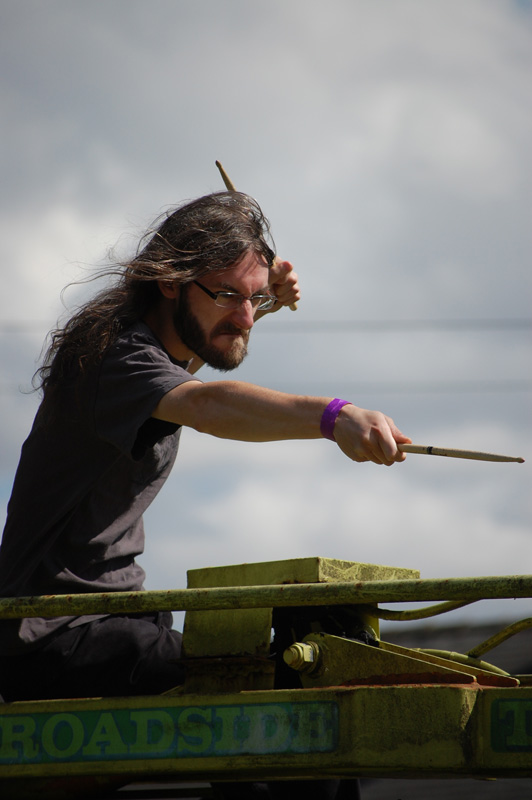 T.V.: The last member who joined the band was experienced drummer and percussionist Tom Leg. Is this line-up a steady one and can you share some words about all the Leafblade members?
T.V.: The last member who joined the band was experienced drummer and percussionist Tom Leg. Is this line-up a steady one and can you share some words about all the Leafblade members?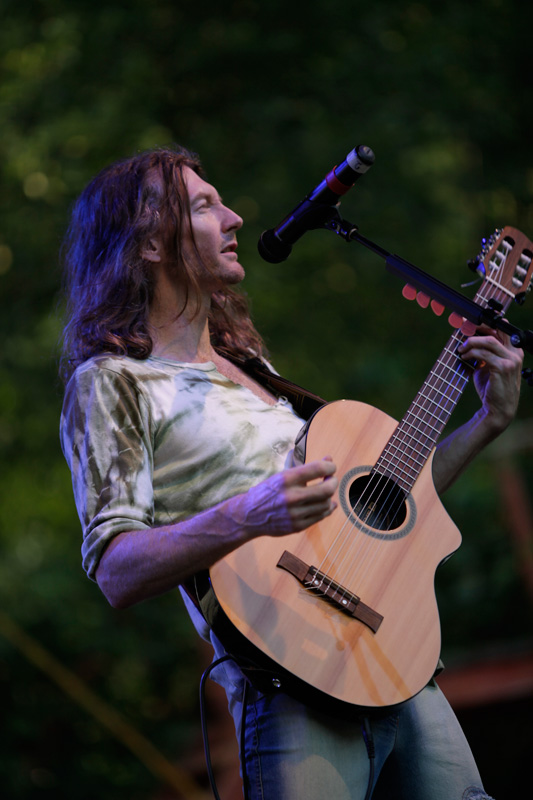 for occult and astological constructs, the inherent power and intelligence behind nature and the unfolding universe. I must be composed enough in order to compose. It is an axiom which ties in with my love of active and passive meditation, evocation of creative consciousness, the highest of our powers within. In the Hindu sense, it is all breath, whether I stand alone on a hilltop and observe the sunset, or perhaps listen to the waves on the shore, or evoke, and convey, as an actor must, the themes within my songs. I am one and the same being, celebrating stillness within. (To be honest, difficult on stage, amidst the madness of sound, audience and technical issues!) This theme of stillness is central to my being, for it focuses on polarity, centre, creativity, and the infinity in silence, allowing the brain to play with any frequencies it wishes to conjure. It is something I have employed since childhood, and instills me with the notion that the faster everyone is around me, I must time lapse like an old oak and enter a slower frame. The irony is, in 'slowness', one achieves 'the quickening'. I employ this in my physical training and serotonin release, and in my creative overdrive. As Confucius says: 'In your stillness, be as a sage; in your action, a king'. I'll deliberately slow, until I'm in a wonderful, slow-motion Zen frame, then the thought-processing reaches, from that control, heights of wonder, celebration of the heart and blood, ecstatic rapture. Against the Buddhist concept of 'life as suffering', I make attempts at rapture, creativity, exercise, study and intentionality of consciousness in my everyday life, allowing it to permeate into my creativity, my lyrics. There is a great deal I see and experience in the world which moves against me, which unsettles me, boils my blood. I must employ these techniques to overide this unsettling. So the Poet steps out, attempts to metaphorically soar above it and through it, absorb it, even, seeking, with intentionality, exactly what it is that will focus the senses elsewhere: love of the infinity of the self, the multiverse, the senses, and the pitiable, yet immense wonder of the human condition. All we are is a creature of spirit and flesh; an amalgam of the intellectual and emotional mind.
for occult and astological constructs, the inherent power and intelligence behind nature and the unfolding universe. I must be composed enough in order to compose. It is an axiom which ties in with my love of active and passive meditation, evocation of creative consciousness, the highest of our powers within. In the Hindu sense, it is all breath, whether I stand alone on a hilltop and observe the sunset, or perhaps listen to the waves on the shore, or evoke, and convey, as an actor must, the themes within my songs. I am one and the same being, celebrating stillness within. (To be honest, difficult on stage, amidst the madness of sound, audience and technical issues!) This theme of stillness is central to my being, for it focuses on polarity, centre, creativity, and the infinity in silence, allowing the brain to play with any frequencies it wishes to conjure. It is something I have employed since childhood, and instills me with the notion that the faster everyone is around me, I must time lapse like an old oak and enter a slower frame. The irony is, in 'slowness', one achieves 'the quickening'. I employ this in my physical training and serotonin release, and in my creative overdrive. As Confucius says: 'In your stillness, be as a sage; in your action, a king'. I'll deliberately slow, until I'm in a wonderful, slow-motion Zen frame, then the thought-processing reaches, from that control, heights of wonder, celebration of the heart and blood, ecstatic rapture. Against the Buddhist concept of 'life as suffering', I make attempts at rapture, creativity, exercise, study and intentionality of consciousness in my everyday life, allowing it to permeate into my creativity, my lyrics. There is a great deal I see and experience in the world which moves against me, which unsettles me, boils my blood. I must employ these techniques to overide this unsettling. So the Poet steps out, attempts to metaphorically soar above it and through it, absorb it, even, seeking, with intentionality, exactly what it is that will focus the senses elsewhere: love of the infinity of the self, the multiverse, the senses, and the pitiable, yet immense wonder of the human condition. All we are is a creature of spirit and flesh; an amalgam of the intellectual and emotional mind.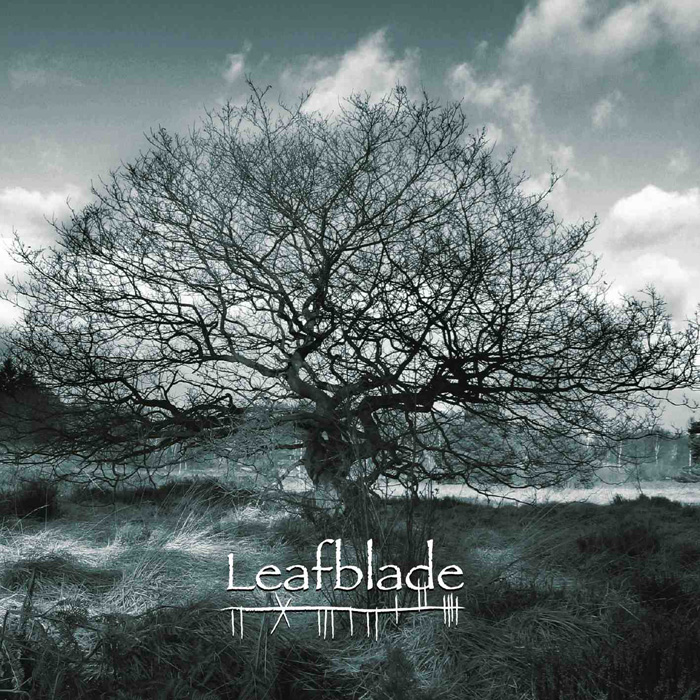 types have it, but it can vanish in later childhood. Mine, as a poet, weaver of words and a spirit that delights in solitudes and the silent voices within, has remained, and in fact keeps renewing itself in waves! Memories, dreams, reflections, as Professor Jung would have it, woven with personal associations through stories, seasons, moon phases, sunlight, snow, pouring rain, voice patterns, textures, silent places of the earth. I regularly get out to the depths of the countryside, to the quiet places, and listen to one's beating heart, birdsong, or the movement of the stream, wind in the trees, buzzards singing out in the valley. It creates a magical wonder within. I have to deal with the quotidian, day to day nonsense like everybody else, and god knows, seen and experienced enough shit in recent years, but I have made a concerted effort to maintain my interests intellectual, quantum, comparative, mystical, creative. This is the true human condition, our greatest inheritance as creatures of blood, electromagnetism, and cerebral processing. And we must recall that we possess a primarily unused, but no less thunderous, intuitive right-brain. The right hemisphere, door to the magical realms within and without the self. This is our key, in a Zen sense, to the Information Universe. Spirituality, mysticism, ties in with this – the pursuit of one's personal soul path, without being fed religious dogma and creed, and all its other tiny-minded trappings. I'm not religious, but I am deeply spiritual. I treat all 'messiahs' and 'masters' as brothers, entities with whom I can teach, and be taught by. I do not want to worship them, this is a pointless and outmoded pursuit, and I daresay these deities to not want it our worship. If I evoke, bring through an ancient Babylonian God or Bronze age woodland deity, then they can show me the respect, in that I have, in a metaphorical sense, 'rubbed Aladdin's Lamp' and can be granted the three wishes! This, for me, is the reality, the quantum, mystical inner light to all life: intelligence, vibration, frequency. In the Hindu sense, all there is, is 'breath'. In mysticism and 'magical' pursuits, we attempt to align one's consciousness with the unfolding universe around us. We steer our vessels of reason throught the precarious waters of intuition, whether in a transcendental sense, a consciousness-shifting 'magical' or occult-study format, or through the taking of toxins. Somewhere, in my humble philosophy, there is a fabulous meeting ground between our deepest soul's desires, and what the Fates have in store for us...
types have it, but it can vanish in later childhood. Mine, as a poet, weaver of words and a spirit that delights in solitudes and the silent voices within, has remained, and in fact keeps renewing itself in waves! Memories, dreams, reflections, as Professor Jung would have it, woven with personal associations through stories, seasons, moon phases, sunlight, snow, pouring rain, voice patterns, textures, silent places of the earth. I regularly get out to the depths of the countryside, to the quiet places, and listen to one's beating heart, birdsong, or the movement of the stream, wind in the trees, buzzards singing out in the valley. It creates a magical wonder within. I have to deal with the quotidian, day to day nonsense like everybody else, and god knows, seen and experienced enough shit in recent years, but I have made a concerted effort to maintain my interests intellectual, quantum, comparative, mystical, creative. This is the true human condition, our greatest inheritance as creatures of blood, electromagnetism, and cerebral processing. And we must recall that we possess a primarily unused, but no less thunderous, intuitive right-brain. The right hemisphere, door to the magical realms within and without the self. This is our key, in a Zen sense, to the Information Universe. Spirituality, mysticism, ties in with this – the pursuit of one's personal soul path, without being fed religious dogma and creed, and all its other tiny-minded trappings. I'm not religious, but I am deeply spiritual. I treat all 'messiahs' and 'masters' as brothers, entities with whom I can teach, and be taught by. I do not want to worship them, this is a pointless and outmoded pursuit, and I daresay these deities to not want it our worship. If I evoke, bring through an ancient Babylonian God or Bronze age woodland deity, then they can show me the respect, in that I have, in a metaphorical sense, 'rubbed Aladdin's Lamp' and can be granted the three wishes! This, for me, is the reality, the quantum, mystical inner light to all life: intelligence, vibration, frequency. In the Hindu sense, all there is, is 'breath'. In mysticism and 'magical' pursuits, we attempt to align one's consciousness with the unfolding universe around us. We steer our vessels of reason throught the precarious waters of intuition, whether in a transcendental sense, a consciousness-shifting 'magical' or occult-study format, or through the taking of toxins. Somewhere, in my humble philosophy, there is a fabulous meeting ground between our deepest soul's desires, and what the Fates have in store for us...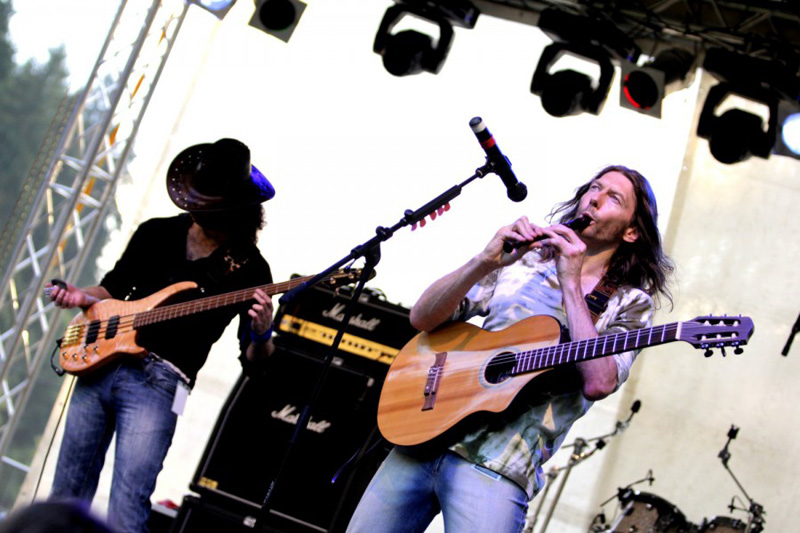 play live as a full rock band, as an acoustic duo, and so on..., yet you have many live experiences behind you. What can the audience expect from your live sets and where and when will your fans have a chance to see you live in the near future?
play live as a full rock band, as an acoustic duo, and so on..., yet you have many live experiences behind you. What can the audience expect from your live sets and where and when will your fans have a chance to see you live in the near future?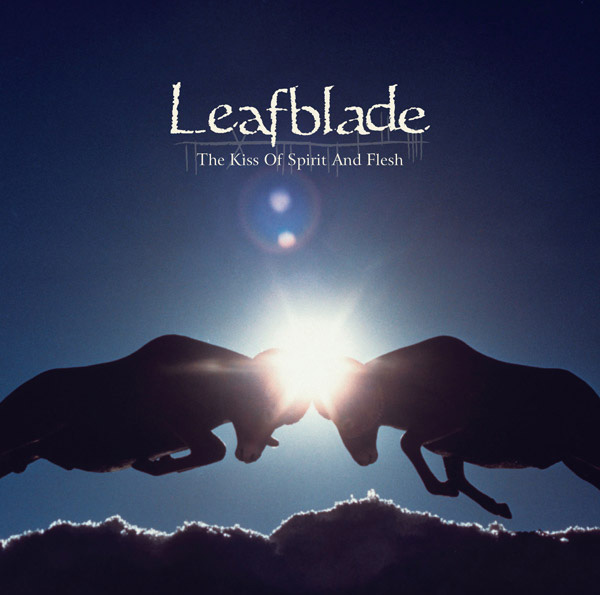 And Mars. We had to get Kscope to chase up the photographer and secure the copyright, and he was a great spirit to talk to, and overjoyed at the use of his photo! The original front cover, for anyone interested, should have been the cosmic purple image Leafblade have on their Facebook page. For us, this image, with the starry wash and the purple wonder, signified a greater passion; deeper and more enduring, in line with the wonder of the artist, always looking skyward. As good as the actual blue front cover is on The Kiss Of Spirit And Flesh, it's a bit tame compared to the mighty purple and crimson version. For whatever reason, the graphics design department at Kscope didn't go for it, so now the image looks like the cover of National Geographic. Next time, Leafblade will have full say in their artistic expression, and celebrate the image in glory, sunlight and stars!
And Mars. We had to get Kscope to chase up the photographer and secure the copyright, and he was a great spirit to talk to, and overjoyed at the use of his photo! The original front cover, for anyone interested, should have been the cosmic purple image Leafblade have on their Facebook page. For us, this image, with the starry wash and the purple wonder, signified a greater passion; deeper and more enduring, in line with the wonder of the artist, always looking skyward. As good as the actual blue front cover is on The Kiss Of Spirit And Flesh, it's a bit tame compared to the mighty purple and crimson version. For whatever reason, the graphics design department at Kscope didn't go for it, so now the image looks like the cover of National Geographic. Next time, Leafblade will have full say in their artistic expression, and celebrate the image in glory, sunlight and stars!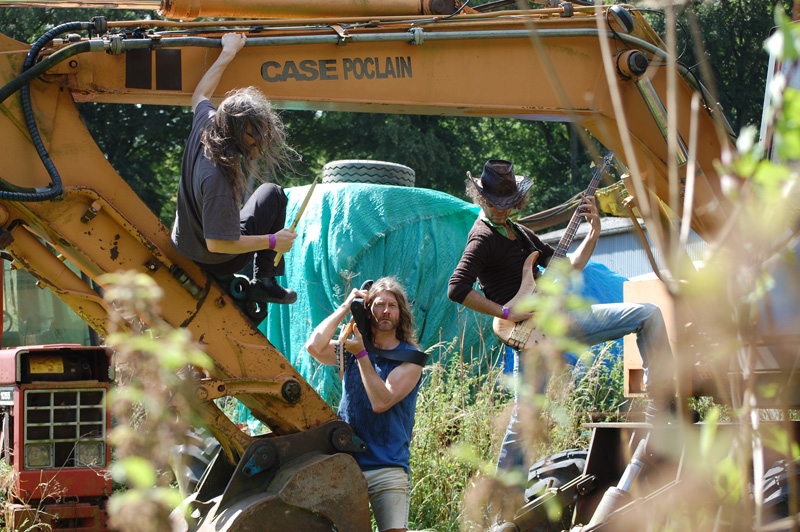 T.V.: This is a bit standard question, but I'm really interested to know who are musicians and bands that influenced you in any way?
T.V.: This is a bit standard question, but I'm really interested to know who are musicians and bands that influenced you in any way?Leafblade links: Facebook, Soundcloud, Kscope